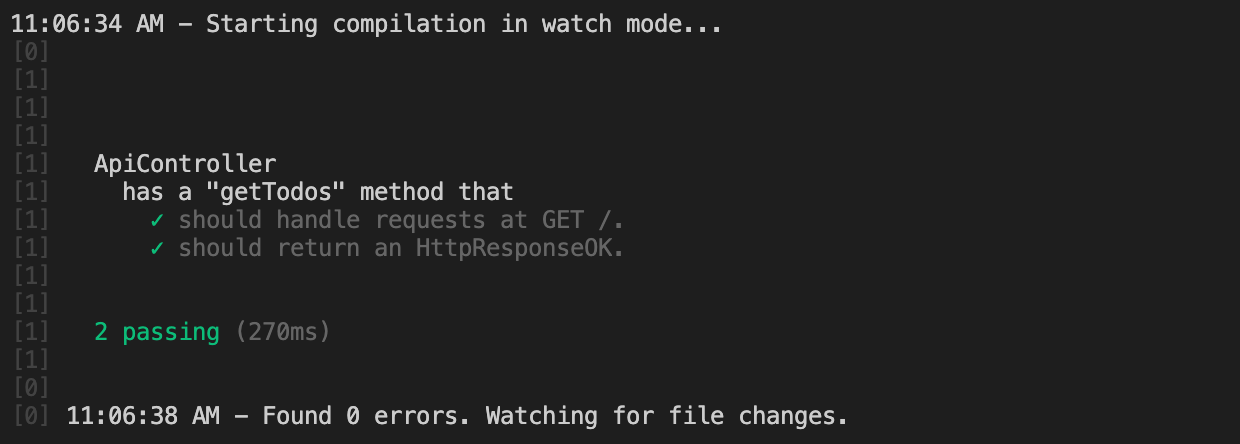Pruebas Unitarias
El último paso de este tutorial es añadir algunas pruebas unitarias al ApiController.
Un archivo de pruebas unitarias termina con la extensión spec.ts y suele colocarse junto al archivo que está probando.
Abra el archivo api.controller.spec.ts y sustituya su contenido.
// std
// The `assert` module provides a simple set of assertion tests.
import { ok, strictEqual } from 'assert';
// 3p
import { createController, getHttpMethod, getPath, isHttpResponseOK } from '@foal/core';
import { DataSource } from 'typeorm';
// App
import { Todo } from '../entities';
import { ApiController } from './api.controller';
import { createDataSource } from '../../db';
// Define a group of tests.
describe('ApiController', () => {
let dataSource: DataSource;
let controller: ApiController;
// Create a connection to the database before running all the tests.
before(async () => {
// The connection uses the configuration defined in the file config/test.json.
// By default, the file has three connection options:
// - "database": "./test_db.sqlite3" -> Use a different database for running the tests.
// - "synchronize": true -> Auto create the database schema when the connection is established.
// - "dropSchema": true -> Drop the schema when the connection is established (empty the database).
dataSource = createDataSource();
await dataSource.initialize();
});
// Close the database connection after running all the tests whether they succeed or failed.
after(async () => {
if (dataSource) {
await dataSource.close();
}
});
// Create or re-create the controller before each test.
beforeEach(() => controller = createController(ApiController));
// Define a nested group of tests.
describe('has a "getTodos" method that', () => {
// Define a unit test.
it('should handle requests at GET /todos.', () => {
// Throw an error and make the test fail if the HTTP method of `getTodos` is not GET.
strictEqual(getHttpMethod(ApiController, 'getTodos'), 'GET');
// Throw an error and make the test fail if the path of `getTodos` is not /todos.
strictEqual(getPath(ApiController, 'getTodos'), '/todos');
});
// Define a unit test.
it('should return an HttpResponseOK.', async () => {
// Create fake todos.
const todo1 = new Todo();
todo1.text = 'Todo 1';
const todo2 = new Todo();
todo2.text = 'Todo 2';
// Save the todos.
await Todo.save([ todo1, todo2 ]);
const response = await controller.getTodos();
ok(isHttpResponseOK(response), 'response should be an instance of HttpResponseOK.');
const body = response.body;
ok(Array.isArray(body), 'The body of the response should be an array.');
strictEqual(body[0].text, 'Todo 1');
strictEqual(body[1].text, 'Todo 2');
});
});
});
Como un método del controlador devuelve un objeto
HttpResponse, es realmente fácil probar el estado y el cuerpo de la respuesta.
Si el método del controlador toma un objeto
Contextcomo argumento, puede instanciar uno asínuevo Contexto({ /* contenido del objeto "request" de Express */}).
Ejecute las pruebas.
npm run test
Este comando vigila sus pruebas y archivos probados en los directorios
app/yscripts/. Cuando se modifica un archivo, recompila automáticamente y vuelve a ejecutar sus pruebas.
Ahora debería terminar con esta salida:

¡Enhorabuena! ¡Ha llegado al final de este tutorial!
Si tiene alguna pregunta, ¡no dude en abrir una issue en Github!
El código fuente completo está disponible aquí.